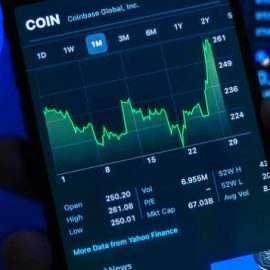

This article is an excerpt from the Shortform book guide to "The Four" by Scott Galloway. Shortform has the world's best summaries and analyses of books you should be reading.
Like this article? Sign up for a free trial here.
Just how big are the big four tech companies? What are the four deep human desires that these companies appeal to?
The Four—Amazon, Apple, Facebook, and Google—are among the largest companies in the U.S., and their products and services infiltrate every aspect of American life. In The Four, Scott Galloway takes a hard look at these technology companies that dominate the modern marketplace.
Keep reading for an explanation of just how pervasive these companies are and the two factors that are major contributors to their continuing success.
The Size and Pervasiveness of the Four
As of 2018, Apple, Alphabet (Google’s parent company), Amazon, and Facebook were the first, second, third, and fifth-largest companies in the US, respectively (the fourth was Microsoft). The big four tech companies all had market caps in the hundreds of billions—$888, $773, $748, and $534 billion, respectively.
(Shortform note: Market cap, short for market capitalization, means “the total dollar market value of a company’s outstanding shares of stock” (in other words, the price per share multiplied by the total number of outstanding shares). For example, a company with 10 million shares selling at $100 a share would have a market cap of $1 billion. Market cap is used in the investment community to determine a company’s size and value, and is considered a more reliable indicator than sales or total assets. As of 2022, Apple, Alphabet, and Amazon were still in the top five biggest companies in America by market cap, but Facebook (Meta Platforms) had dropped to number six, and Microsoft and Tesla had risen to second and fifth places, respectively.)
The Four’s products and services infiltrate almost every aspect of American life. We use Amazon to purchase everything from garden tools to groceries to streaming movies. We communicate on Apple phones and work on Apple computers. We stay connected with friends and family on Facebook. And we rely on Google for answers to every imaginable question.
In fact, says Galloway, 64% of US households have Amazon Prime. Amazon controls 44% of US online commerce and has a 77% share of voice technology. Apple, the most profitable company in history, earns 79% of the profits of the global smartphone market. Out of the 7.5 billion people in the world, 1.5 billion use Facebook on a daily basis. Additionally, Facebook owns four of the top five mobile apps in the US—Facebook, Facebook Messenger, Instagram, and WhatsApp. Together, these apps (along with their web versions) consume approximately 50 minutes of each of their users’ typical days. Google commands a 92% share of the internet search market and fields 3.5 billion search queries a day.
(Shortform note: Since The Four was published, these companies’ products have become even more omnipresent in the daily lives of Americans and people worldwide. As of 2022, 76.6% of US households had an Amazon Prime subscription. Approximately one billion people around the world in 2019 were using more than 1.4 billion individual Apple products. Facebook had almost 2 billion daily users, who spent an average of 88 minutes a day on Facebook and Instagram combined. Although Google doesn’t publish exact figures, some estimates place the average number of Google searches per day at 8.5 billion.)
The Vision of the Four
Galloway claims that the success of the Four is due in part to the fact that they each started with a simple vision that attracted major capital investment.
For example, notes Galloway, Amazon managed to raise more than $2.1 billion in investors’ money before it broke even, relying on a simple story: “Earth’s Biggest Store.” It told this story via the business and tech media, which resulted in the market bidding Amazon’s stock higher. Backed by so much cheap capital, and therefore not reliant on profit, Amazon was able to take huge risks and sustain significant failures, allowing it to grow rapidly.
(Shortform note: Some commentators have noted that, while the origin stories of the Four involve people dreaming up visionary ideas in a dorm room or garage, this is a far cry from the way the tech industry works today. Startups still have the ability to succeed based on a simple vision that attracts capital, but to do so they often have to rely on the platforms created by the Four. For example, many companies, Netflix among them, don’t have the internal capabilities to store all of their content, so they have to pay Amazon’s cloud computing subsidiary, Amazon Web Services, to store their content on Amazon servers.)
The Four’s Ability to Appeal to Our Deepest Desires
Galloway argues that, in addition to benefiting from a simple story that attracts cheap capital, the success of the Four is due to the fact that they appeal to our deepest human desires: for consumption (Amazon), procreation (Apple), love (Facebook), and God (Google).
Desire #1: Consumption
Galloway believes that our desire to buy products on Amazon can be traced back to our earliest ancestors. For 90% of human history, he explains, we were a hunter-gatherer society. Over-accumulating was a question of survival: The more stores of food and other necessities you had on hand, the more likely you were to survive natural disasters such as famine or drought. Galloway says that we have retained our ancestors’ instinct to collect as many goods as possible—and Amazon makes it easy to satisfy that instinct by giving us almost immediate access to all manner of consumer goods. Modern capitalist society further reinforces our instinct for accumulating goods by positioning consumption as a noble act that improves the economy.
| Other Instincts Driving Consumption In The Consuming Instinct, marketing professor Gad Saad suggests that our drive to consume is even more powerful than Galloway claims. Saad argues that our desire to consume everything from burgers to cars stems not only from our survival instinct but also from several other Darwinian instincts: to help others and to help those who help us. Our instinct to help others—in particular, those with whom we share genes—means we’ll spend money to support our family and friends. And the instinct for reciprocity leads us to make purchases in order to pay back others for having helped us, as well as to create debts that others must then pay back to us. According to Saad, although culture plays a role in consumerism, we’re also at the mercy of these innate evolutionary forces when making purchasing decisions. |
Desire #2: Procreation
According to Galloway, when we purchase Apple products, we’re similarly motivated by an innate need—in this case, the need to procreate. He claims that people want luxury products like Apple phones because it makes them more attractive to prospective partners. Only about 1% of the world can afford Apple products—so carrying one signals to others that you’re in an exclusive group of wealthy, successful individuals. This makes you a more desirable mate from the standpoint of natural selection.
(Shortform note: Galloway suggests that, according to the principles of natural selection, wealthy individuals are more attractive than non-wealthy individuals. Research both supports and refutes this claim: Across cultures, wealthy men are more likely to reproduce, but wealthy women are less likely to reproduce. In addition, male wealth more strongly correlates with reproduction in subsistence societies, whereas the correlation is weaker in industrial nations.)
Apple is able to sell low-cost products at premium prices precisely because these products have become luxury goods emphasizing scarcity, exclusivity, and aesthetics. Galloway says that, due to its status as a luxury brand, Apple is the only one of the Four likely to survive in the long term.
(Shortform note: In Contagious, marketing expert Jonah Berger explains why a product’s perceived scarcity and exclusivity result in increased sales. He argues that when a company emphasizes its product’s scarcity and exclusivity, its customers feel special because they’ve managed to access something that is out of reach for many—they’re part of a group that not just anyone can join. This, in turn, causes customers to brag about the product as a means of gaining “social currency.” The more they talk about the product, the more “word of mouth” marketing they generate. Berger contends that this word-of-mouth advertising is the primary driver of a product’s sales and ultimate success.)
Desire #3: Love
Facebook can help fulfill our deep need for love and relationships, says Galloway. He cites a 75-year, $20 million Harvard research study finding that the strongest indicator of happiness over a person’s lifetime is the depth and meaningfulness of their relationships. Facebook fosters those relationships by allowing us to stay connected with friends and family no matter how far away they are or how long it’s been since we’ve seen them.
(Shortform note: The study cited by Galloway began with 238 Harvard students in 1938 and reached many of its conclusions prior to 2008, when Facebook became available to the general public. The study found that happiness comes not from wealth or fame, but from close relationships. However, the study didn’t comment on whether Facebook could help foster or maintain those close relationships; its conclusions related solely to in-person, rather than online, relationships.)
Desire #4: God
Finally, Galloway equates Google to a modern god. People entrust Google with questions that they’ve never asked anyone else before: Approximately one out of every six search requests are completely novel questions. In addition, the fact that Google provides organic search results (in other words, you can’t pay to appear higher up on the list) increases user trust in the company. Users see Google as a benevolent, omnipresent part of their everyday lives.
(Shortform note: Former Google product manager Tristan Harris claims that, far from being a benevolent god, Google steals our time and attention to help it sell more ads. Like other Big Tech platforms, Google is designed to be addictive, says Harris. The more time we spend on these companies’ platforms, the more likely we are to view ads or purchase something from their advertisers. Because they rely on advertising money to enable them to provide their “free” service to consumers, they have every incentive to do whatever they can to keep our attention trained on their platforms.)

———End of Preview———
Like what you just read? Read the rest of the world's best book summary and analysis of Scott Galloway's "The Four" at Shortform.
Here's what you'll find in our full The Four summary:
- A hard look at the success of Amazon, Apple, Facebook, and Google
- How The Four have had a profound and negative impact on our society
- How to make it in the cutthroat economy created by The Four






